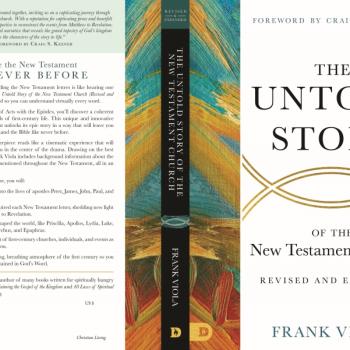 John 3 is divided into two main sections. First is the encounter between Jesus and Nicodemus (3:1-21). Second is another witness by John the Baptist (3:22-36). There are no parallels to these stories in the synoptic gospels. The two stories are connected by the interrelated themes of Spirit and Light.
John 3 is divided into two main sections. First is the encounter between Jesus and Nicodemus (3:1-21). Second is another witness by John the Baptist (3:22-36). There are no parallels to these stories in the synoptic gospels. The two stories are connected by the interrelated themes of Spirit and Light.
This chapter also introduces an interesting issue in the study of John. Although Jesus does on occasion give lengthy discourses in the synoptic gospels (e.g. Mt. 5-7; 24), more frequently he speaks in short sayings and parables. The mode of Jesus' discourse is quite distinct in John. For example, Jesus rarely tells parables in John. The general pattern in John is that a question or issue arises, there is a discussion, generally a sign, a lengthy and often rather esoteric discourse by Jesus, and finally some editorial comments by John. In a sense, in the synoptic gospels Jesus teaches ethics while in John he teaches theology.
Nicodemus
The story begins with Nicodemus approaching Jesus in private at night, presumably so that he will not be publicly seen with Jesus. He is described as a Pharisee and a "ruler of the Jews," meaning a member of the governing Sanhedrin (Jn. 11:47), the Jewish senate or national council. Nicodemus later appears defending Jesus against accusations (Jn. 7:50-52) and providing spices to anoint Jesus' body (Jn. 19:40). He is never mentioned in the synoptic Gospels. Nicodemus respectfully addresses Jesus as "Rabbi" and accepts Jesus as "a teacher from God" (3:2), but evidently not (yet?) as a prophet or as the Messiah.
Born Again? (3:3-8)
It is not clear why Nicodemus has come to see Jesus. He doesn't ask a question, but—as often happens in John—Jesus simply makes an enigmatic statement: "unless one is born from above/again he cannot see the kingdom of God" (3:3). Presumably this is in response to Nicodemus hailing him as a great teacher, but not accepting him as the Messiah or Son of God. That is to say, because he has not been born from above, Nicodemus—unlike Nathanael (1:49)—sees Jesus as a rabbi but nothing more, and thus cannot see that the kingdom of God is here and that Jesus is its King-Messiah (12:13-15, 19:12-15). To overcome this misperception one must be "born from above/again." It is important to note that there is an ambiguity in the Greek text, which says you must be "born anōthen." The core meaning of anōthen is "from above, from on high" as can be seen in its use in the Septuagint, where it nearly always describes a spacial relationship. In the New Testament its fundamental meaning likewise designates a spacial relationship of "above," but can also indicate a temporal relationship of repetition, hence "anew or again." In light of the later allusions to "heavenly things" (3:12) and "ascending to heaven" (3:13), it is likely that the original intent here was being "born from above." We can also see this when we compare the three different ways Jesus describes this idea.
- "Unless one is born from above he cannot see the kingdom of God" (3:3).
- "Unless one is born of water and the Spirit, he cannot enter the kingdom of God" (3:5).
- "That which is born of flesh is flesh, and that which is born of the Spirit is spirit" (3:6).
The essential idea here is that one must be born from above/of the Spirit to see/enter the kingdom of God. The idea of being born anōthen is a different way of saying born of the Spirit, and since the Spirit comes from above, the best way to understand it is being born from above. The traditional Western Christian translation of being "born again" derives from the Latin Vulgate translation, which renders anōthen as denuo, which is unambiguously "again." The fact that Nicodemus understands anōthen as "born again" (3:4) requires Christ to explain the idea further (3:5-8), while chiding Nicodemus for not understanding (3:10). This indicates that Nicodemus' "born again" interpretation was a misunderstanding. Being born from above thus means being born from heaven and the Spirit. He who is born from above becomes a child of God.
The idea of being "born again" is not discussed elsewhere in the Gospels, though it is mentioned in two passages from 1 Peter (1 Pet. 1:3, 1:23). Here, however, a different Greek term is used, anagennaō, which means literally "to be born again." It is likely that these passages refer broadly to the same concept of spiritual regeneration.
How would a first-century Jew like Nicodemus have understood the idea of being "born from above"? Jesus seems to think that Nicodemus, "the teacher of Israel" should be able to grasp the idea (3:10). And, indeed, Jewish tradition maintained that "the proselyte is like a new-born child" (B. Talmud, Yevamot 22a); hence conversion to Judaism was understood as a spiritual rebirth. Ordinary Jewish proselyte conversion was always marked by an immersion ritual, paralleling being "born of the water" in John (3:5). However Jesus is going beyond this. To be born from above means to be immersed in the Spirit, to emerge out of the darkness into the light (3:21), and to have eternal life (3:16). From the traditional Jewish perspective, the Jews do not need to undergo this proselyte immersion or spiritual regeneration, since they are born in the covenant of Abraham. This is something only for gentile converts. But Jesus is saying that even life-long Jews like Nicodemus must undergo a new water immersion, immersion in the Holy Spirit, and spiritual regeneration in order to see and enter the new kingdom of God of the king-messiah Jesus.





